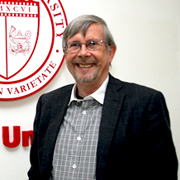
Vice President of Academic Affairs
Doctor of Education in TESOL Program Designer
Senior Professor: TESOL
Dr. Rod Ellis is Vice President of Academic Affairs, Senior TESOL Professor and the designer of the Doctor of Education in TESOL degree program at Anaheim University. A distinguished thought leader in the field of Second Language Acquisition, Prof. Ellis received his Doctorate from the University of London and his Master of Education from the University of Bristol. A former professor at Temple University both in Japan and the US, Prof. Ellis has served as the Director of the Institute of Language Teaching and Learning at the University of Auckland, a John Curtin Distinguished Professor at Curtin University, and has taught in numerous positions in England, Japan, the US, Zambia and New Zealand. Dr. Ellis, who is known as an expert in Second Language Acquisition, is author of the Oxford University Press Duke of Edinburgh Award-Winning Classic "The Study of Second Language Acquisition", as well as numerous student and teacher-training textbooks for Prentice Hall and Oxford University Press, Prof. Ellis's textbooks on Second Language Acquisition and Grammar are core textbooks in TESOL and Linguistics programs around the world.

Professor: TESOL
Alessandro Benati is a professor at University College Dublin (Ireland). He has held positions in several British and overseas institutions. He is known for his work in second language acquisition, and he published ground-breaking research on the pedagogical framework called processing instruction. His research on processing instruction has been recently driven by the use of new online measurements (e.g., eye tracking, self-paced reading). Alessandro has coordinated national and international high-impact research projects which have been influential in determining educational policy and had an impact in providing effective language teacher training. He is author and co-author of several research monographs and peer-reviewed articles in high-ranked journals. Editor and co-editor of book series and scientific journals such as Cambridge Elements in SLA and Instructed Second Language Acquisition. He was a member of the sub-panel for Modern Languages and Linguistics for the Research Excellence Framework for England (REF 2021), and he is Honorary Professor at Your SJ University (UK), University of Hong Kong, and Associate Professor at Anaheim University (USA).
PUBLICATIONS & PRESENTATIONS
Monographs
1. Benati, A. (forthcoming in 2021) Key terms: A pocket guides for language teachers. London: Equinox.
2. Benati, A. (forthcoming in 2021). Input processing and processing instruction: The acquisition of Italian and Modern Standard Arabic. Benjamins Publishing – Bilingual Processing Series.
3. Chan, M., Benati, A. (2021). Challenges Encountered by Chinese ESL learners in L2 acquisition: Problems and Solutions from complementary perspectives. Springer.
4. Benati, A. (2020) Key Questions in Second Language Teaching. Cambridge University Press.
5. VanPatten, B., Smith, M., Benati, A., (2019). Key Questions in Second Language Acquisition: An Introduction (Cambridge University Press.
6. Schwieter, J., Benati, A. (2019). The Cambridge Handbook of Language Learning. Cambridge University Press.
7. Malovrh, P., Benati, A. (2018). The Handbook of Advanced Proficiency in Second Language Acquisition. Wiley-Blackwell.
8. Benati, A. Yamashita. (2017). S. Theory, Research and Pedagogy in Learning and Teaching Japanese Grammar. London: Palgrave.
9. Benati, A., Angelovska, T. (2016). Second Language Acquisition: A Theoretical Introduction to Real World Application. Bloomsbury: London.
10. Van Patten, B., Benati, A. (2015). Second Language Acquisition: Key Terms. 2nd Edition. London: Bloomsbury (translated into Japanese).
11. Benati, A. (2015) Key Methodological frameworks in Second Language Research. London: Equinox.
12. Benati, A., Laval, C., Arche, M. (2014). The Grammar Dimension in Instructed Second Language Learning. London: Bloomsbury.
13. Lee, J., Benati, A. (2013). Individual Differences and Processing Instruction. London: Equinox.
14. Benati, A. (2013). Key Issues in Second Language Teaching. London: Equinox.
15. Benati, A. (2011). (Ed.) A Guidebook for Language Teaching. High Commissioner For Minority Languages & British Council Macedonia. (translated into Macedonian, Turkish, Serb, and Albanian).
16. Van Patten, B., Benati, A. (2010). Second Language Acquisition: Key Terms. London: Continuum.
17. Benati, A., Lee, J. (2010). Processing Instruction and Discourse. London: Continuum.
18. Benati, A. (2009). (Ed.) Issues in Second Language Proficiency. London: Continuum.
19. Benati, A. (2009). Japanese Language Teaching: A Communicative Approach. London: Continuum.
20. Lee, J., Benati, A. (2009). Research and Perspectives on Processing Instruction. New York: Mouton de Gruyter.
21. Benati, A., Lee, J. (2008). Grammar Acquisition and Processing Instruction: Secondary And Cumulative Effects. Clevedon: Multilingual Matters.
22. Lee, J., Benati, A. (2007). Delivering Processing Instruction in Classroom and in Virtual Contexts: Research and Practice. London: Equinox.
23. Lee, J., Benati, A. (2007). Second Language Processing: An Analysis of Theory, Problems and Possible Solutions. London: Continuum.
24. Benati, A., Van Patten, B., Wong, W. (2005). Input Processing and Processing Instruction. (Teoria e sperimentazione nell’acquisizione dell’italiano come lingua straniera). Roma: Armando.
25. Liverani-Bertinelli, F., Benati, A. (2001). Grammatica: Perchè? Quando? Come? Perugia: Perugia: Edizioni Guerra Perugia.
Book chapters
1. Benati, A., Schwieter, J. (forthcoming in 2022). Input processing in L1 acquisition and simultaneous bilingualism. In Handbook of SLA and Input Processing. Routledge.
2. Benati, A. (forthcoming in 2022). Processing instruction and individual differences. Springer.
3. Benati, A. (2021). Processing Instruction: Research, theory and practical implications of the learning and. teaching of English grammar to Chinese L1 speakers. In M. Chan & Benati, A. Challenges Encountered by Chinese ESL learners in L2 acquisition: Problems and Solutions from complementary perspectives. Springer.
4. Benati, A. (2021). Focus on Form. Cambridge Elements in SLA: Cambridge University Press.
5. Benati. A. (2020). Focus on Form. Entry in the reference book Research Questions in Language Education and Applied Linguistics. Springer.
6. Benati, A., Schwieter, J. (2019). Pedagogical interventions to L2 grammar instruction. In J. Schwieter & A. Benati, A. (Ed.) (475-499). The Cambridge Handbook of Language Learning. Cambridge: Cambridge University Press.
7. Benati, A. (2018). Structured Input. In J. I. Liontas (Gen. Ed.), The TESOL Encyclopedia of English Language Teaching. NewYork: Wiley.
8. Benati, A. (2018). Direct Method. In J. I. Liontas (Gen. Ed.), The TESOL Encyclopedia of English Language Teaching. NewYork: Wiley.
9. Benati, A. (2018). Role Play. In J. I. Liontas (Gen. Ed.), The TESOL Encyclopedia of English Language Teaching. NewYork: Wiley.
10. Benati, A. (2018). Grammar Translation Method. In J. I. Liontas (Gen. Ed.), The TESOL Encyclopedia of English Language Teaching. NewYork: Wiley.
11. Benati, A. (2018). Interlanguage Grammar. In J. I. Liontas (Gen. Ed.), The TESOL Encyclopedia of English Language Teaching. NewYork: Wiley.
12. Benati, A., Schwieter, J. (2017). Input Processing and Processing Instruction: Pedagogical and cognitive considerations for L3 acquisition In A. Tanja & A. Hahn (eds.), L3 Syntactic Transfer: Models, New Developments and Implications (195-223). Amsterdam: Benjamins.
13. Benati, A., Basile, B. (2017). Theoretical and Pedagogical Views on the Role of Grammar Instruction. In A. Benati & S. Yamashita, Theory, Research and Pedagogy in Learning and Teaching Japanese Grammar (7-38). London: Palgrave.
14. Benati, A.(2017). Processing Instruction and the Acquisition of Japanese Morphology and Syntax. In A. Benati & S. Yamashita, Theory, Research and Pedagogy in Learning and Teaching Japanese Grammar (73-98). London: Palgrave.
15. Benati, A. Rastelli, S. (2014). Input processing theory: imparare a processare la seconda lingua", in S. Rastelli, Il processing nella seconda lingua: teorie, dati sperimentali, didattica (139-156). Roma: Carocci.
16. Benati, A. (2014). Second Language Acquisition. In C. Fäcke (Ed.). Language Acquisition (179-197). New York: Mouton de Gruyter.
17. Benati, A. (2013). Proficiency (entry in Encyclopedia). In P. Robinson (Ed.). The Routledge Encyclopedia of Second Language Acquisition. New York/London: Routledge.
18. Benati, A. (2013). Introduction. Grammar Dimension in Instructed Second Language Learning. In A.Benati, C.Laval & M.Arche. The Grammar Dimension in Instructed Second Language Learning (1-25). London: Bolomsbury.
19. Benati, A. (2013). The Input Processing Theory. In P. Garcia Mayo, Contemporary Approaches to Second Language Acquisition (93-110). Amsterdam: John Benjamins.
20. Angelovska, T., Benati, A. (2013). Processing instruction and the age factor: Can adults and school-age native speakers of German process English simple past tense correctly? In J. F. Lee & A. Benati (eds.), Individual differences and Processing Instruction (131-152). Sheffield, UK: Equinox.
21. Mavrantoni, M., Benati, A. (2013). The effects of processing instruction and traditional instruction on two different school-age learners: The case of English present simple tense third person singular. In J. F. Lee & A. Benati (eds.), Individual differences and Processing Instruction (185-210). Sheffield, UK: Equinox.
22. Benati, A. (2013). Age and the effects of processing instruction on the acquisition of English passive constructions among school children and adult native speakers of Turkish. In J. F. Lee & A. Benati (eds.), Individual differences and Processing Instruction (83-104). Sheffield, UK: Equinox.
23. Benati, A., Lee, J., Hikima, N. (2010). Exploring the effects of processing instruction on discourse-level interpretation tasks with the Japanese passive construction. In A. Benati & J. F. Lee, Processing instruction and discourse (148-177). London: Continuum.
24. Benati, A., Lee, J.., McNulty,E. (2010). Exploring the effects of processing instruction on a discourse-level guided composition with the Spanish subjunctive after the adverb cuando. In A. Benati & J. F. Lee, Processing instruction and discourse (97-147). London: Continuum.
25. Benati, A. (2009) Issues in second language proficiency. In A. Benati. (Ed.) Issues in Second Language Proficiency (3-6). London: Continuum.
26. Benati, A. (2009). Secondary and cumulative effects in attaining L2 proficiency in the classroom (with Cecile Laval). In A. Benati. (Ed.) Issues in Second Language Proficiency (189-201). London: Continuum.
27. Benati, A., Lee, J., Houghton, S. (2008). From processing instruction on the acquisition of English past tense to secondary transfer-of-training effects on English third person singular present tense. In A.Benati & J. Lee, Grammar acquisition and processing instruction: Secondary and cumulative effects (88-120). Bristol: Multilingual Matters.
28. Benati, A., Lee, J., Laval, C. (2008). From processing instruction on the acquisition of French imparfait to secondary transfer-of-training effects on French subjunctive and to cumulative transfer-of-training effects with French causative constructions. In A. Benati & J. F. Lee, Grammar acquisition and processing instruction: Secondary and cumulative effects (121-157). Bristol: Multilingual Matters.
29. Lee, J. F., Benati, A., Aguilar-Sánchez J., & McNulty, E. (2007). Comparing three modes of delivering processing instruction on preterite/imperfect distinction and negative informal commands in Spanish. In J. F. Lee & A. Benati, Delivering processing instruction in classrooms and virtual contexts: Research and practice (73-98). London: Equinox.
30. Benati, A. (2006). The effects of processing instruction and meaning output-based instruction on the acquisition of the Italian subjunctive of doubt. In R. Kiely, P.Rea-Dickins, H. Woodfield, and G. Clibbon (Eds.) Language, Culture and Identity in Applied Linguistics (181-198). London: Equinox
31. Benati, A. (2004). The effects of structured input and explicit information on the acquisition of gender agreement in Italian and the simple paste tense in Spanish (with P. Romero-Lopez). In M. Baynham, A. Deignan, and G.White (Eds.) Applied Linguistics at the Interface (29-46). London: Equinox.
32. Benati, A. (2004). The effects of structured input activities and explicit information on the acquisition of the Italian future tense. In B. Van Patten (Ed.), Processing Instruction: Theory Research and Commentary (207-226). NJ: Lawrence Erlbaum.
33. Benati, A. (1997). Classroom research in second language learning on the effects of different types of form- focused instruction. The input processing type. In S. Efstathiadis. and A. Tsangalidis (Eds.) Proceedings of the 11th International Symposium on Theoretical and Applied Linguistics (61-68). Aristotle University of Thessaloniki.
Journal articles
1. Benati, A. (2021). The effects of structured input and traditional instruction on the acquisition of the English causative forms: An eye-tracking study measuring accuracy in responses and processing patterns. (under review - Language Teaching Research)
2. Benati, A. (2020). The effects of structured input and traditional instruction on the acquisition of the passive constructions: An eye-tracking study. Forthcoming in Instructed Second Language Acquisition.
3. Chiucchiu, G., Benati, A. (2020). The effects of structured input and textual enhancement on the acquisition of Italian Subjunctive: A self-paced reading study. Forthcoming in Instructed Second Language Acquisition.
4. Benati, A., Batziou M. (2019). The relative effects of isolated and combined structured-input and structured-output on the acquisition of English causative. International Review of Applied Linguistics in Language Teaching, 57 (3), 265-288.
5. Benati, A. (2019). The role of instruction: An update. Language Teaching Research Quarterly, 11, 1-11.
6. Benati, A., Batziou M. (2019). Discourse and long-term effects of isolated and combined structured-input and structured-output on the acquisition of English causative form. Accepted and forthcoming in Language Awareness, 28, 1-18.
7. Benati, A., Farhat, A (2018). The effects of motivation and processing instruction in the acquisition of Modern Standard Arabic gender agreement. Instructed Second Language Acquisition, 2, 60-81.
8. Benati, A., Rastelli, S (2018). Special Issue: Perspectives in the neurocognition of the second language teaching-acquisition interface. Second Language Research, 34, 3-7.
9. Benati, A. (2017). The role of input and output tasks in grammar instruction: Theoretical, empirical and pedagogical considerations. Studies in Second Language Learning and Teaching, 3, 377-396.
10. Benati, A. (2017). Classroom-oriented research: Processing Instruction (findings and implications). Language Teaching, 343-359.
11. Benati, A. (2016). Input manipulation, enhancement and processing: theoretical views and empirical research. Studies in Second Language Learning and Teaching, 6, 65-88.
12. Benati, A. (2015). The Effects of Processing Instruction on the Acquisition of English Past Simple Tense: Age and Cognitive Task Demands, International Review of Applied Linguistics in Language Teaching, 53, 249-269.
13. Benati, A. (2015). The Effects of Re-exposure to Processing Instruction on the acquisition of Japanese Passive. International Review of Applied Linguistics in Language Teaching, 53, 127-150.
14. Benati, A. (2010). Grammar Instruction and Processing Instruction in second language acquisition. Journal of Applied Linguistics, 26, 43-58.
15. Benati, A. (2007). The effects of processing instruction on the lexical preference principle: generalizability of findings. Rivista di Psicolinguistica Applicata, 7, 93-104.
16. Benati, A. (2006). Some reflections on input and input processing. Scuola e Lingue Moderne, 4-5, 56-60.
17. Benati, A. (2005). The effects of processing instruction, traditional instruction and meaning-output instruction in the acquisition of English past simple tense. Language Teaching Research, 9, 67-93.
18. Benati, A. (2005). Ricercazione nella classe di lingua. Rassegna Italiana di Linguistica Applicata, 2-3, 53-73.
19. Benati, A. (2004). The effects of processing instruction and its components on the acquisition of gender agreement in Italian. Language Awareness, 13, 67-80.
20. Benati, A. (2004). Grammar and grammar instruction in a communicative framework: the processing instruction approach. Studies in Japanese Language Teaching, 11, 53-73.
21. Benati, A. (2003). The role of explicit instruction in instructed second language acquisition: New data from Italian. Rivista di Psicolinguistica Applicata, 2-3, 143-153.
22. Benati, A. (2001) A comparative study of the effects of processing instruction and output-based instruction on the acquisition of the Italian future tense. Language Teaching Research, 5, 95-127.
23. Benati, A. (2001). Focus on form in the classroom. The role of different type of form-focused instruction on the acquisition of a second language: theoretical, empirical and pedagogical issues. Rivista di Psicolinguistica Applicata, 1, 161-179.
24. Benati, A. (2000). What grammar?: A comprehension-based approach to grammar instruction in foreign language teaching. Rassegna Italiana di Linguistica Applicata, 2,109-127
25. Benati, A. (2000). Processing Instruction: un tipo di grammatica comunicativa per la classe di lingua straniera. Il caso del futuro italiano. Italica, 77, 473-494.
26. Benati, A. (1998). Processing grammar instruction: a type of grammar instruction for the language classroom. TUTTITALIA, 18, 22-26.
27. Benati, A. (1997). Evoluzione nella ricerca sperimentale sugli effetti dell’insegnamento formale in programmi comunicativi per l’apprendimento di una lingua due. Annali Università di Perugia, 24, 65-73.
28. Benati, A. (1996). Evaluating oral communicative competence. A pilot test in the Italian classroom. Bulletin of the Society for Italian Studies, 29, 12-18.
29. Benati, A. (1996). L’insegnamento comunicativo della lingua (ICL) nel corso di lingua straniera: un modello di insegnamento. TUTTITALIA, 14, 3-8.
30. Benati, A. (1995). The role of formal instruction: theoretical-empirical and pedagogical consideration. TUTTITALIA 12, 19-26.

Assistant Professor: TESOL
Dr. Scott Aubrey is a TESOL Assistant Professor in the Anaheim University Graduate School of Education. Scott Aubrey received his Ph.D. in Applied Linguistics from the University of Auckland in 2016. He has taught at language schools and universities in Korea, Japan, and Hong Kong. Scott’s research and teaching interests include L2 motivation, the role of inter-cultural contact (inside and outside the classroom) in language learning, task-based language teaching, and L2 writing instruction. His published work includes articles in leading journals such as TESOL Quarterly, Language Teaching Research, and The Modern Language Journal. Scott currently lives in Hong Kong and teaches courses in English language education at The Chinese University of Hong Kong.

Graduate School of Education Chair of Research
TESOL Professor, Graduate School of Education
Dr. Hayo Reinders is Chair of Research and TESOL Professor for the Anaheim University Graduate School of Education. Holding a Ph.D. in Language Teaching and Learning from the University of Auckland, Dr. Reinders is also Professor of Education and Head of Department at Unitec in Auckland, New Zealand. His previous positions include Head of Learner Development at Middlesex University in London, Director of the English Language Self Access Centre at the University of Auckland in New Zealand and associate professor at RELC in Singapore. He has worked with teachers from a large number of countries worldwide and has been visiting professor in Japan, Thailand, Mexico and the Netherlands. Dr. Reinders edits the journal 'Innovation in Language Learning and Teaching' as well as a book series on ‘New Language Learning and Teaching Environments’ for Palgrave Macmillan. He is Editor of Innovation in Language Learning and Teaching, and Convenor of the AILA Research Network for CALL and the Learner. Dr. Reinders' interests are in technology in education, learner autonomy, and out-of-class learning, and he is a speaker on these subjects for the Royal Society of New Zealand. His most recent books are on teacher autonomy, teaching methodologies, and second language acquisition.

Assistant Professor: TESOL
Dr. Stephen Ryan is a TESOL Assistant Professor in the Anaheim University Graduate School of Education and a professor in the School of Culture, Media, and Society at Waseda University in Tokyo. Stephen Ryan has been involved in language education for over 25 years, and for most of that time, he has been based in Japan. His research and publications cover various aspects of psychology in language learning, including the award-winning Exploring Psychology in Language Learning and Teaching, co-authored with Marion Williams and Sarah Mercer, and The Psychology of the Language Learner Revisited, co-authored with Zoltan Dörnyei. He is also series editor for the Multilingual Matters book series Psychology of Language Learning and Teaching. He holds a Ph.D. from the University of Nottingham School of English Studies and an M.A. in Linguistics (TESOL) from the University of Surrey.
Publications
- Ryan, S. (2020)). Individual differences and motivation. In M. Lamb, K. Csizer, A. Henry, & S. Ryan (eds.). Palgrave handbook of motivation for language learning. Basingstoke: Palgrave Macmillan.
- Lamb, M., Csizer, K. Henry, A. & Ryan. S. (eds.). (2020) Palgrave handbook of motivation for language learning. Basingstoke: Palgrave Macmillan.
- Ryan, S. 2019). Language learner motivation: What motivates motivation researchers? In J. W. Schwieter & A. Benali (eds.) The Cambridge handbook of language learning., pp. 409-429) Cambridge: Cambridge University Press.
- Ryan, S. & Irie, K. Learning Across Generations: A Small-Scale Initiative. In Innnovation in English Education in Japan.(pp. 97-116). Basingstoke: Palgrave Macmillan.
- Reinders, H., Ryan, S., & Nakamura, S. (eds.) (2019) Innovation in English Education in Japan. Basingstoke: Palgrave Macmillan.
- Ryan S., Nakamura S., Reinders H. (2019) Innovation in Japan: Looking to the Future. In: Reinders H., Ryan S., Nakamura S. (eds) Innovation in English Education in Japan, pp. 283-289). Basingstoke: Palgrave Macmillan.
- Reinders H., Nakamura S., Ryan S. (2019) he Scope of Innovation in Japanese Language Education.. In: Reinders H., Ryan S., Nakamura S. (eds) Innovation in English Education in Japan, pp. 1-8). Basingstoke: Palgrave Macmillan.
- Lamb, M., Csizer, K., Henry, A. & Ryan, S.(eds). (in press). Palgrave handbook of motivation for language learning. Basingstoke: Palgrave Macmillan.
- Irie, K., Ryan, S., Mercer, S. (2018). Using Q methodology to investigate pre-service EFL teachers’ mindsets about teaching competences. Studies in Second Language Learning and Teaching, 8(3), 575-598.
- Ryan, S. (2018). Motivation. In Richards, J. & Burns, A. (eds.). Cambridge Guide to Learning English as a Second Language. (pp. 55-62). Cambridge: Cambridge University Press.
- Ryan, S. (2017). Emotion in Language Learning. Teaching Times. 7-8.
- Ryan, S. (2016). Quantitative and qualitative methods. In A. Linn (Ed.) Investigating English in Europe. pp, 167-73. Berlin:De Gruyter Mouton.
- Ryan, S.. (2016). Motivation and Foreign Language Learning: From theory to practice (Review). English Language Teaching Journal 70 (2), 225-227
- Mercer, S. & Ryan, S. (2016). Stretching the boundaries: Language learning psychology. Palgrave Communications, 2, 1-5. Ryan, S. & Mercer, S. (eds.) (2015) Psychology in language learning : Special issue. Studies in Second Language Learning and Teaching, 5(3).
- Boo, Z., Dörnyei, Z., & Ryan, S. (2015). L2 motivation research 2005-2014: Understanding a publication surge and a changing landscape. System 55, 145-157
- Ryan, S. & Mercer, S. (eds.) (2015) Psychology in language learning : Special issue. Studies in Second Language Learning and Teaching, 5(2).
- Ryan, S. (2015). An interview with Tomoko Yashima. The Language Teacher, 39 (4), 17-20.
- Ryan, S. (2015). The horse, the water, and the horse’s reflection: Understanding language learner narrative identity in the classroom. Humanising Language Teaching., 17 (4).
- Ryan, S. & Mercer, S. (eds.) (2015) Psychology in language learning 1: Special issue. Studies in Second Language Learning and Teaching.
- Williams, M., Mercer, S. & Ryan, S. (2015). Exploring psychology for language teachers. Oxford: Oxford University Press.
- Dörnyei. Z., & Ryan, S. (2015). The psychology of the language learner revisited. New York: Routledge.
- Yoshijima, S. & Ryan, S. (eds.) (2015). Foreign language education: Foreign language education in the era of glocalization. Asahi Press: Tokyo.
- Irie, K. & Ryan, S. (2015). Identifying patterns of changes in self-perception: Q Methodology. In Sage research methods cases. London: Sage Publications.
- Irie, K. & Ryan, S. (2015). Study abroad and the dynamics of change in learner L2 self-concept. In Z. Dörnyei, P.
- MacIntyre, & A. Henry (Eds.), Motivational dynamics in language learning (pp. 343-366). Bristol: Multilingual Matters. Ryan, S. & Irie, K. (2014). Imagined and possible self perspectives: Storied selves. In S. Mercer & M. Williams (Eds.). Multiple Perspectives on the Self in SLA (pp. 109-123). Bristol: Multilingual Matters.
- Yoshijima, S. & Ryan, S. (eds.) (2014). Foreign language education: Roles and challenges in general education. Asahi Press: Tokyo.
- Ryan, S. & Mercer, S. (Eds.) (2013). The role of the imagination in language learning. Studies in Second Language Learning and Teaching- Special Issue
- Ryan, S. & Dörnyei, Z. (2013). The long-term evolution of language motivation and the L2 self. In A. Berndt (Ed.), Fremdsprachen in der Perspektive lebenslangen Lernens (Foreign languages in the perspective of lifelong learning) Frankfurt: Peter Lang.
- Mercer, S. & Ryan, S. (2013). Praising to learn: Learning to praise. In M. Reitbauer, N. Campbell, S. Mercer, J. Schumm Fauster, R. Vaupetitsch (eds.) Feedback matters: Current feedback practices in the EFL classroom (pp. 21-36). Frankfurt: Peter Lang.
- Ryan, S. (2012). Motivation. In M. Byram & A. Hu (Eds.) Routledge Encyclopedia of Language Teaching and Learning.. London: Routledge
- Ryan, S. (2012). Theories of motivation. In M. Byram & A. Hu (Eds.) Routledge Encyclopedia of Language Teaching and Learning.. London: Routledge
- Ryan, S. & Mercer, S. (2012). Implicit theories: Language learning mindsets. In S. Mercer, S. Ryan & M. Williams (Eds.) Psychology in Language Learning: Insights from theory and research (pp. 74-89). Basingstoke: Palgrave Macmillan.
- Mercer, S., Ryan, S., & Williams, M. (Eds.). (2012). Psychology in Language Learning: Insights from theory and research. Basingstoke: Palgrave Macmillan.
- Ryan, S. & Mercer, S. (2012). Language learning mindsets across cultural settings: English Learners in Austria and Japan. OnCUE Journal 6 (1), 6-22
- Mercer, S., & Ryan, S. (2011). Advanced learners’ perceptions of effective language learning strategies: Are they ‘fit for purpose’? In In E. Schwarz, & S. Mercer (Eds.), Language Learning at the Tertiary Level (pp. 9-32). Graz: ITAT.
- Ryan, S., & Mercer, S. (2011). Natural talent, natural acquisition and abroad: learner attributions of agency in language learning. In G. Muray, T. Lamb, & A. Gao (Eds.), Identity, Motivation and Autonomy: Exploring their links (pp. 160-176). Bristol: Multilingual Matters.
- Ryan, S. (2011). Integrating an ELF perspective to English education in Japan: Motivational challenges and opportunities. Senshu University Annual Bulletin of the Humanities, 41
- Mercer. S, & Ryan, S. (2010) A Mindset for EFL: Learners’ beliefs about the role of natural talent. English Language Teaching Journal 64 (4), 436-444
